
International registry in organ donation and transplantation (IRODAT) – 2021 worldwide data
Marian Irazabal2, Chloe Balleste1, Estephan Arredondo2, Ricard Valero1, Marti Manyalich1.
1Transplant Coordination, Barcelona Clinic Hospital, Barcelona, Spain; 2Project Coordinator, DTI Foundation, Barcelona, Spain
Introduction: IRODaT is the first registry in this field, which contains statistics of deceased/living donors and transplants. Out of the 111 countries with organ donation or transplantation (D&T) activity, 86 national reporters have submitted data to IRODaT during the last 19 years.
Methods: Each participant country inserts their own data to the website and all data are validated. The information registered follows the definition of “The Critical Pathway of Deceased Donation (1)”, ensuring uniformity throughout the registry and aiding correct interpretation of the data by the scientific community. The data could be verified contacting the official reporter when it is needed. The compilation of all this information worldwide can be accessed by the whole community.
Results: Currently twenty one countries have summited the database from 2021 at the IRODaT registry. Although organ D&T rates mostly dropped as expected due to the emergency of COVID-19 worldwide, some countries had the highest improvement in deceased donation (DD) compared to 2020 data, such as: Spain (from 37,97 to 40,2 pmp), USA (from 38,03 to 41,88 pmp), Italy (from 21,6 to 22,52 pmp); Czech Republic (from 23,3 to 25,06 pmp), Argentina (from 9,82 to 13,13 pmp) and Iceland (from 13,33 to 29,35 pmp); while Australia, Austria, Denmark and Estonia reported a downward trend with16 from 18 pmp; 20,26 from 23,9 pmp;16,90 from 21,38 pmp and 15,79 from 24,83 pmp and respectively. The increase in the DD activity of Saudi Arabia and United Arab Emirates is significant by 150% and 400% compared to the previous year. Regarding Brazil and Portugal preliminary data, the numbers collected included only the first semester of 2021 and are excluded in the figure 1.

Six countries have reported an increase in Donation After Cardiac Death (DCD type III) including Spain, the US and Italy, in which DCD donation represents more than 30% of their total number of deceased donations. Thus far, thirteen countries have reported living donation activity (LD) led by Saudi Arabia (37,4 ppm), the US (19,75 ppm) and Cyprus (11,59 ppm). The number of LD performed was affected significantly since many programs were deferred.
Conclusions: In 2021, the challenges hospitals faced, including restrictions, flight reductions and border closures affected national programs worldwide as reflected above. Nevertheless, coordination and transplant teams have minimized the impacts of the pandemic and while health resources were globally disproportionally affected, certain countries managed to increased D&T rates.
References: Dominguez-Gil B., et al. Transplant Int. 2011; 24: 373-378.2. IRODaT. Available at: www.irodat.org.

right-click to download
